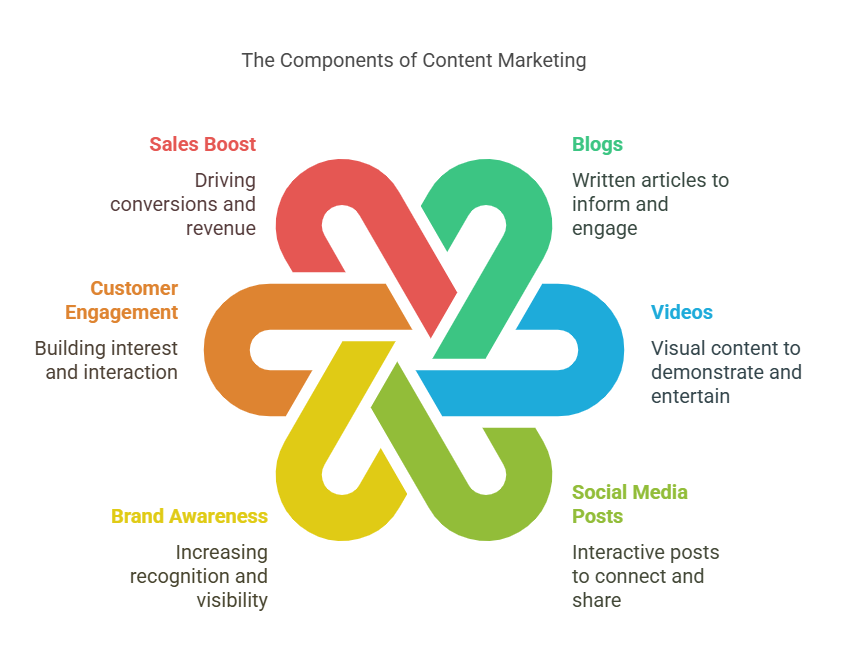Content marketing is crucial for ecommerce businesses. It helps attract and engage customers, which leads to more sales. In this post, we will explore the Content Marketing Tools and how they can help you grow. These tools are easy to use, and many are perfect for beginners. Let’s dive into the top tools to make content marketing simpler and more effective.
What Is Content Marketing?
Content marketing involves creating and sharing valuable content. This content can be blogs, videos, social media posts, and more. The goal is to attract and keep customers interested in your products or services. Ecommerce businesses use content marketing to increase brand awareness, drive traffic, and boost sales.

Why Are Content Marketing Tools Important for Ecommerce?
Running an ecommerce business is tough. It’s not just about selling products; it’s about making your brand visible and building trust with customers. Content marketing tools help you create, organize, and distribute content efficiently. They also help track your progress and show what works.
Without the right tools, it can be hard to stay on top of everything. The right tools can save you time and effort. They also make content creation easy, even for small businesses.
Top Content Marketing Tools for Ecommerce Businesses
Here are some of the best content marketing tools for ecommerce businesses.
1. HubSpot
HubSpot is one of the most popular content marketing tools for ecommerce businesses. It is an all-in-one tool that can help with blog posts, email marketing, social media, and more. It offers a user-friendly platform with helpful analytics to track your progress.
Key Features:
-
Easy blog creation and publishing.
-
Email marketing automation.
-
Social media management.
-
Detailed reporting and analytics.
According to HubSpot, 60% of marketers use it for their content marketing needs. (Source: HubSpot)
2. BuzzSumo
BuzzSumo is great for discovering what content is trending in your niche. You can see what works and create similar content that appeals to your audience. It helps ecommerce businesses by providing insights into what content gets shared the most on social media.
Key Features:
-
Content research and analysis.
-
Social media tracking.
-
Influencer identification.
-
Trend tracking for specific topics.
Studies show that businesses that use BuzzSumo for content strategy see better engagement on social media. (Source: BuzzSumo)
3. SEMrush
SEMrush is a tool mostly used for SEO, but it’s excellent for content marketing too. It helps ecommerce businesses optimize their content and rank higher in search engines. SEMrush provides keyword research tools, SEO audits, and content tracking features.
Key Features:
-
Keyword research and analysis.
-
SEO audits for your website.
-
Content tracking and optimization.
-
Competitive research.
SEMrush claims that businesses that use its content tools have a 45% higher chance of ranking on Google’s first page. (Source: SEMrush)
4. Canva
Canva is a tool that makes creating visuals easy. Visual content is key to ecommerce success. Canva offers templates for everything from social media posts to product photos. It’s simple and easy to use, even if you don’t have a design background.
Key Features:
-
Drag-and-drop design editor.
-
Templates for social media, blogs, and ads.
-
Collaborative features for teams.
Many ecommerce businesses use Canva to create high-quality, eye-catching graphics for their marketing campaigns.
5. Mailchimp
Mailchimp is a popular email marketing tool. For ecommerce businesses, email marketing is one of the best ways to engage customers. Mailchimp helps you design beautiful emails and send them automatically to your subscribers. It also tracks how your emails perform.
Key Features:
-
Email campaign management.
-
Automation of email sequences.
-
Detailed analytics for email performance.
-
Personalization options for email content.
Mailchimp is used by over 12 million people to grow their businesses. (Source: Mailchimp)
6. Google Analytics
Google Analytics is a free tool that provides insights into how visitors interact with your website. It helps ecommerce businesses understand which content works and where to improve. It can track everything from website traffic to conversions.
Key Features:
-
Website traffic analysis.
-
Conversion tracking.
-
Audience insights.
-
Real-time reporting.
According to Google, businesses that use Google Analytics are more likely to increase their conversion rates. (Source: Google)
7. Hootsuite
Hootsuite is a social media management tool. It helps ecommerce businesses manage and schedule posts across multiple platforms like Facebook, Instagram, and Twitter. Hootsuite also tracks performance and engagement on social media.
Key Features:
-
Social media scheduling.
-
Analytics and reporting.
-
Social listening tools.
-
Team collaboration.
Hootsuite reports that 70% of social media managers use it to improve engagement. (Source: Hootsuite)
8. Trello
Trello is a project management tool that helps teams organize content. It’s especially useful for ecommerce businesses with multiple people working on content marketing. You can use Trello to plan, track, and assign tasks related to content creation.
Key Features:
-
Task organization and tracking.
-
Collaboration tools.
-
Integration with other tools like Google Drive.
Trello is used by over 50 million people worldwide to organize their work. (Source: Trello)
Benefits of Using Content Marketing Tools for Ecommerce
Content marketing tools help ecommerce businesses grow in many ways. Here are some of the main benefits:
1. Saves Time
With the right tools, you can automate many parts of your content marketing. This saves you a lot of time and effort.
2. Improves Content Quality
Content marketing tools help you create better content. Tools like Canva help you design visuals, while tools like BuzzSumo show you what content your audience will like.
3. Increases Traffic and Sales
When you use content marketing tools to create high-quality content, it can lead to more website traffic and higher sales.
4. Better Tracking and Analytics
Many content marketing tools offer analytics features. These tools help you see which content is working and which needs improvement. This helps you focus on what drives the best results.
Latest Statistics on Content Marketing Tools for Ecommerce
According to a report from Statista, 72% of marketers believe content marketing is the most effective digital marketing strategy for ecommerce businesses. (Source: Statista)
A survey by Content Marketing Institute found that 64% of successful ecommerce companies use content marketing tools to enhance their marketing efforts. (Source: Content Marketing Institute)
Frequently Asked Questions (FAQs)
1. What is the best content marketing tool for ecommerce businesses?
The best content marketing tool depends on your needs. However, tools like HubSpot, BuzzSumo, and SEMrush are excellent for most ecommerce businesses.
2. How can content marketing help ecommerce businesses?
Content marketing helps ecommerce businesses by attracting and engaging customers. It can also boost brand awareness and increase sales.
3. Are content marketing tools expensive?
Many content marketing tools offer free versions or trials. The paid versions are usually affordable, especially for small businesses.
4. How can I track the success of my content marketing?
Use tools like Google Analytics and SEMrush to track website traffic, conversions, and the effectiveness of your content.
5. How do I choose the right content marketing tool for my ecommerce business?
Consider your business goals, budget, and the features you need. Choose a tool that fits your needs and is easy for your team to use.
Conclusion
Content marketing is vital for the success of ecommerce businesses. The right tools can help you create quality content, track performance, and drive traffic to your website. From HubSpot to Canva, each tool has unique features that can help you grow your business. Start using these tools today and watch your ecommerce business thrive.

